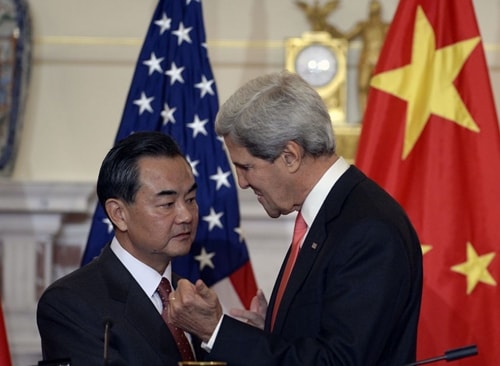America's silent strategy after the 'cow tongue line' ruling
The US is said to be using a "quiet diplomacy" strategy to persuade Asian countries to avoid provocations after the Arbitral Tribunal's ruling on the "cow tongue line".
 |
Chinese warships illegally conduct drills near Vietnam's Hoang Sa archipelago. Photo: Xinhua. |
"What we want is to calm the situation so that problems can be solved rationally rather than emotionally," Reuters quoted an anonymous US administration official describing the confidential diplomatic messages.
Some messages were sent through U.S. embassies abroad and diplomatic missions in Washington. Others were delivered directly to senior officials in the recipient countries by Defense Secretary Ashton Carter, Secretary of State John Kerry and other senior officials.
“This is a call for calm, not an effort to rally the region against China, which would be interpreted as the US leading a coalition to contain China,” the official added.
However, efforts to calm the South China Sea after the ruling from the Arbitration Court in The Hague on July 12 were hindered when Taiwan announced it was sending more warships to the area. Taiwanese leader Tsai Ing-wen also told sailors that their mission was to "protect Taiwan's sovereignty at sea".
The Arbitral Tribunal concluded that China has no historic rights to the area within the "nine-dash line" it drew itself, and that Itu Aba Island, which is illegally controlled by Taiwan, and other structures in the Spratly Islands are not entitled to an exclusive economic zone.
U.S. officials hope the diplomatic initiative will be more successful in Indonesia and the Philippines. Indonesia wants to send hundreds of fishermen to the Natuna Islands to assert sovereignty over nearby areas of the South China Sea that China also claims. Meanwhile, Filipino fishermen have been harassed by Chinese coast guard and navy vessels.
 |
US Secretary of State John Kerry (right) and his Chinese counterpart Wang Yi. Photo: AP. |
A US official said that the new Philippine President Rodrigo Duterte is "in some ways a difficult figure" who has shown both an aggressive attitude and also concessions to China.
According to Philippine Defense Minister Delfin Lorenzana, in a conversation with his US counterpart Ashton Carter ahead of the ruling, Mr. Carter said China had assured the US that they would exercise restraint and Washington was equally determined.The US Defense Secretary hopes to receive similar assurances from the Philippines.
China has repeatedly proposed holding dialogue between Beijing and Manila. Chinese Foreign Minister Wang Yi said it was time to get things back on "the right track" after the "farcical" lawsuit.
People's Daily, the mouthpiece of the Chinese Communist Party, said today that China has shown that it can "fix" territorial issues through negotiations, citing the agreement reached with Vietnam on demarcation in the Gulf of Tonkin and the ongoing negotiations with South Korea.
Meanwhile, China has landed two civilian aircraft on two newly built runways on reefs it occupies in the Spratly Islands, a move the US State Department said would increase tensions rather than ease the situation.
"We are not involved in the dispute except... about freedom of navigation," Mark Toner, a spokesman for the US State Department, said at a press briefing yesterday. "What we want to see is a de-escalation in this very tense region of the Asia-Pacific. We want all parties involved to take the time to consider how we can find a peaceful solution."
However, if that effort fails and competition escalates into confrontation, the US Air Force and Navy are ready to maintain freedom of navigation in the air and sea in the disputed area, a US defense official said yesterday.
The ruling from the Permanent Court of Arbitration is expected to overshadow a meeting of the Association of Southeast Asian Nations (ASEAN) in Laos in late July, where US Secretary of State Kerry and his Chinese counterpart Wang Yi will attend.
Ben Cardin, a Maryland Democrat and ranking member of the US Senate Foreign Relations Committee, said the possibility of confrontation is low if the Philippines, Indonesia, Vietnam and other countries cooperate with the US instead of acting alone.
According to VNE

